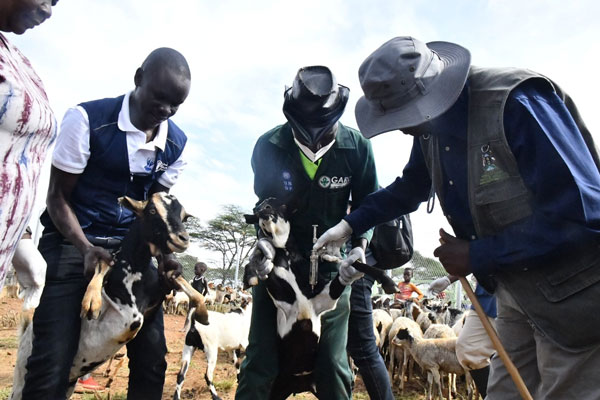
Moroto, Uganda | PATRICIA AKANKWATSA | In a collaborative effort between the Ugandan Government, the Food and Agriculture Organization of the United Nations (FAO), Moroto District Local Government, CARITAS, and VSF Belgium, thousands of livestock in the Karamoja region received essential vaccinations to combat transboundary animal diseases.
Transboundary Animal Diseases pose a significant threat to the livelihoods of Karamoja’s residents, and the project’s early warning systems have reported several TAD outbreaks, with a focus on Foot-and-Mouth Disease (FMD). These reports have triggered a substantial vaccination campaign.
The diseases which were targeted in this crucial initiative include Peste des Petits Ruminants (PPR), Goat pox, Foot-and-Mouth Disease (FMD), Contagious Bovine Pleuropneumonia (CBPP), and Contagious Caprine Pleuropneumonia (CCPP). These vaccinations are part of an ongoing effort to protect the livestock that serves as a lifeline for many communities in Karamoja.
In recent years, Karamoja’s agricultural landscape has been marked by recurring crop failures, casting a shadow over food security in the region. In this challenging environment, where crop production is unreliable, livestock has emerged as a vital lifeline for local communities. Livestock are a source of nutrition and income, and their well-being is paramount for the region’s economic stability.
The vaccination campaign targeted multiple transboundary diseases that have been a cause for concern in Karamoja. This comprehensive approach aims to protect cattle, goats, and sheep, which are central to the livelihoods of many in the region. By vaccinating against these diseases, the campaign intends to curb their spread and minimize their detrimental impact on animal health and food security.
The state minister for Animal Industry, Dr Bright Rwamirama, took an active role in this endeavour. Last week he led a team of veterinary experts and FAO representatives to Karamoja with a dual mission: to safeguard livestock from diseases and provide essential vaccines to counteract transboundary threats.
Dr Rwamirama said that although vaccination has been happening over the years, transboundary animal diseases have no boundaries and keep recurring.
“In order to keep our national herd safe, we do continuous vaccination to keep them from reoccurring here,”
On the transition to new breeds, the minister decried the tortoise move – blaming rustling which has been a common vice in the region for long but also the NGOs which he said are not helping at all.
“They have been here; they’re interested in handouts instead of empowering our people and it’s getting us into a problem. Up to now, some areas are food insecure. So, we need to change the mindset of the people, we are talking to the NGO World that they need to change the approach if they are to work with us, they must fit into government programs so that we empower these communities to be on their own. Karamoja is not a very barren land as one would imagine, the soils are fertile.”
The government has taken steps to address the challenges facing Karamoja’s livestock sector. These measures include the provision of water sources for livestock to reduce unnecessary movement, which can contribute to disease transmission. Plans are also underway to introduce cattle breeds that yield more beef and milk, further enhancing food security in the region.
FAO’s head of the ECTAD Programme, Dr. Bessong Willington, reiterated the organization’s commitment to ensuring food security. He emphasized that livestock assets are especially vital for Karamoja’s community, given the fragile ecosystem in the region.
“Diseases that can be transmitted from one boundary to another are problematic mostly where the government is making efforts to make these animals contribute to the economy of the country,”
He noted that the Government’s efforts to transition farmers to commercial farming will trigger Ugandans to aspire to export their products since there is always strong demand internationally.
“If they must go international, they must meet certain standards – this is where transboundary disease control becomes very important. FAO is providing specific support to this community, to build strong capacities to prevent any risks from happening.”
The team demonstrated the use of acaricides to the local farmers, emphasizing the importance of using a consistent acaricide to kill ticks and tsetse flies. This approach not only safeguards animal health but also prevents the spread of diseases such as trypanosomiasis and sleeping sickness in both livestock and humans.
“We want you to always use the same acaracide when you are going to spray your herd because you kill the ticks but as the cow moves around, any tsetse fly that bites the cow dies. That will save us from the disease of trypanosomiasis and sleeping sickness in human beings,” said the minister.
Dr Anna Rose Ademun Okurut, Commissioner in charge of animal health at the Ministry of Agriculture, highlighted the devastating effects of diseases on livestock, including reduced milk production, meat quality, and livestock mortality.
She decried the high impact of diseases which not only reduce milk production and meat quality but also kill animals. The reason why they vaccinate annually, she said is because it is the vaccine is designed to protect the animal for one year.
“We also know that some animals like goats are short-lived, so if you vaccinated two years ago, today you are talking about a different population,”
The effort was able to vaccinate an impressive 180,000 Tropical Livestock Units, including cattle, goats, and sheep. These animals received vaccines against various diseases, including FMD (140,000 doses), Contagious Bovine Pleuropneumonia (CBPP, 110,000 doses), Contagious Caprine Pleuropneumonia (CCPP, 300,000 doses), Sheep and Goat Pox (SGP, 200,000 doses), and Peste des Petits Ruminants (PPR, 400,000 doses).
 The Independent Uganda: You get the Truth we Pay the Price
The Independent Uganda: You get the Truth we Pay the Price


